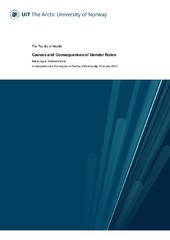| dc.description.abstract | This dissertation addresses the pervasive issue of women’s underrepresentation in agentic work and the equally important (but underexamined) issue of men’s underrepresentation in communal unpaid work. First, I review research and identify what conditions need to be met in order for counterstereotypical role models to break down some of the barriers to women’s entry into agentic work (Chapter 2). One important barrier that is not typically addressed is gender role expectations in the domestic domain. To fill this research gap, I explore how the policy context relates to young, highly educated women’s and men’s future expectations to take parental leave across 37 countries (Chapter 3). Results showed that women intend to take longer leave than men across all countries. Leave intentions were found to be inversely related to career ambitions, suggesting that gender inequality in agentic work will continue to be an issue for future generations to come. Results further suggests that giving men the opportunity to engage with childcare (through making more leave available to both women and men) is not an effective way to promote communal intentions in young men. With the objective of identifying methods of increasing communal engagement in men, I summarize data on predictors of communal engagement in adulthood across 10 countries (Chapter 4) and in early childhood in Norway (Chapter 5). Results showed that boys’ and men’s relative lack of communal engagement is evident across the lifespan and across countries that vary in gender equality. Men’s communal engagement seems to increase with the awareness that other men can be communal. Boys’ communal aspirations, on the other hand, seem to be driven by their communal self-perceptions rather than the perception that other males can be communal. Taken together, these studies have implications for interventions that aim to break down the myriad barriers to gender equality. | en_US |
| dc.relation.haspart | <p>Paper I: Olsson, M. & Martiny, S.E. (2018). Does exposure to counterstereotypical role models influence girls' and women's gender stereotypes and career choices? A review of social psychological research. <i>Frontiers in Psychology, 9</i>, 2264. Also available in Munin at <a href=https://hdl.handle.net/10037/14375>https://hdl.handle.net/10037/14375</a>.
<p>Paper II: Olsson, M., Van Grootel, S., Block, K., Schuster, C., van Laar, C., Schmader, T., Meeussen, L., Croft, A., Sun, M. & Martiny, S.E. Mind the Gender Gap: Parental Leave Policies, Gender Equality, Cultural Value Orientation, and the Intended Uptake of Parental Leave in 37 countries. (Manuscript).
<p>Paper III: Olsson, M.I.T., Froehlich, L., Dorrough, A.R. & Martiny, S.E. The Hers and His of Prosociality Across 10 Countries. (Manuscript). Now published in <i>British Journal of Social Psychology</i>, 2021, available at <a href= https://doi.org/10.1111/bjso.12454> https://doi.org/10.1111/bjso.12454</a>.
<p>Paper IV: Olsson, M.I.T., Martiny, S.E. & Steffens, M.C. When I Grow Up, I Want to Be a Nurse: Do Young Children’s Self-Perceptions and Descriptive Gender Stereotypes Predict their Communal Career Aspirations? (Manuscript). | en_US |


 English
English norsk
norsk
